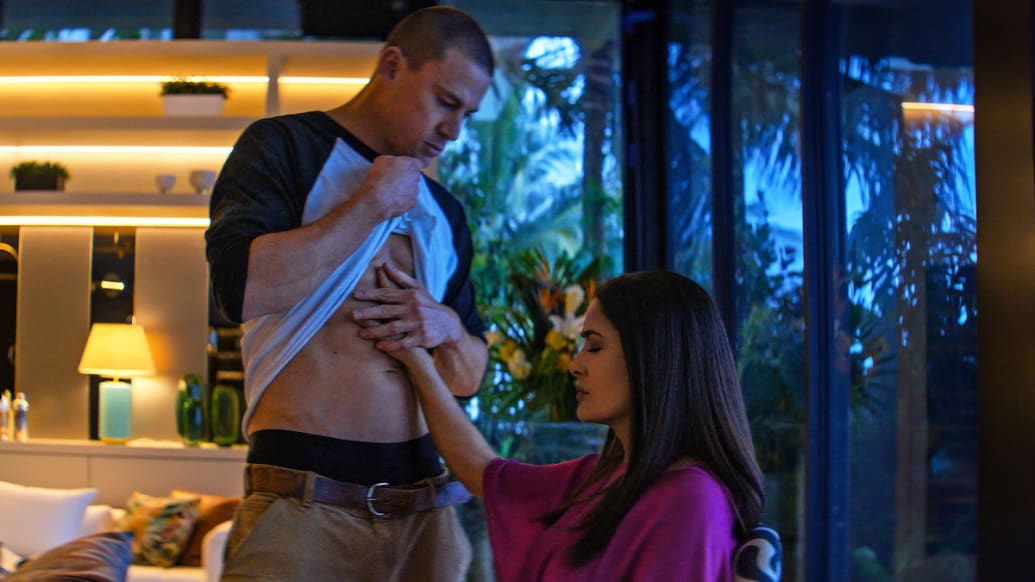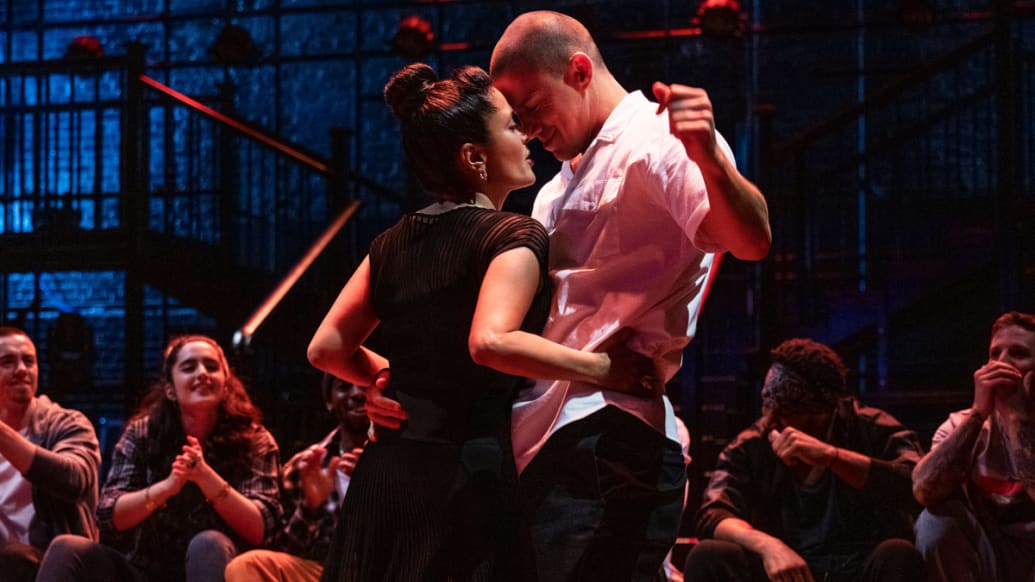that Magic Mike’s Last Dance was the closest you’d ever get to making an outright musical. Was trying your hand at that genre also part of what brought you back?
Yes, and it’s certainly satisfied a lot of that desire. There are certain limitations within the story we’re trying to tell that keep it from being a full-blown musical that spills out into the streets. I’m somewhat restricted by the physical environment in which the movie takes place, which is, in the opening scene, her house in Miami, and then the theater where the show goes on. I’ve got a box of a certain size that I’ve got to work within. We also have a very, very tight schedule, which means in some cases, I have hours to shoot an entire sequence.
It did satisfy a lot of my desire to think about how to do a dance sequence, and multiple dance sequences, and how do I make them all different. What’s the thing that I can bring? I’m standing on the shoulders of a lot of people who’ve done amazing work in this space. What am I bringing to it that’s different? I guess my answer to myself was, well, this is for adults [laughs]. This is not a musical for kids. It’s not a family thing. This is an erotic, sexual, sensual musical.
Were there any musicals you studied for inspiration?
If you look at my Seen, Read list from last year, and at the first four or five months of the year, you can see what I’m looking at. I’m looking at all the Fosse stuff, I’m watching both versions of West Side Story, I’m watching all three versions of That’s Entertainment!, I’m reading these Fosse biographies. I’m trying to get a sense of how other filmmakers have approached how to shoot things, knowing that I’m working in a much more limited sandbox than a lot of these people.
Just looking at something and going, I like that, and then trying to break down, why do I like that? What is it about that sequence that I like? What do I steal? What can I repurpose or tweak to make it fit what we’re trying to do? It’s just homework, and the best part of this job is that your homework is watching great movies.
Max’s inability to finish what she starts felt like a self-referential challenge that you and screenwriter Reid Carolin were giving yourselves. Is that what appeals to you about sequels?
If you’ve been fortunate enough to have a good experience making a film, and there’s a possibility of putting the band back together, that’s always appealing. I loved showing up for Season 2 of The Knick—I was so happy to be back there with all those people because I had such a great experience on Season 1. When I rolled up on day one of Season 2, I was thinking, “Oh, I get it! This is why people do six or seven seasons of a show,” because if you’re having a good experience, it’s really fun to see all your friends again, and to do it again.
The challenge is always, well, what’s different? We can’t just do the same thing we did before. You’re going off your own desire to see something different and to not repeat yourself, with the understanding that people are rolling into this thing with a certain level of expectation, and you have to be very, very careful when you upend that. Because they can get angry!
That’s certainly true of franchise fans.
I wasn’t so worried about this one, because I knew the dynamic for the viewer was going to be very similar to the dynamic of the audience showing up for the live show. Just as in the live show, there’s a left-turn that happens early—in this case, the dance between Channing and Salma. I knew, at that point, this is a clue to the audience that this is what we’re doing. This one is going to be much more intimate, it’s going to be much more emotional, and there’s going to be a relationship in it. The core of the movie is this relationship between Channing and Salma.

Warner Bros. Pictures
The Magic Mike films naturally appeal to female moviegoers, and yet lots of straight men are also fans. What’s the key to making the movies attractive to both demographics?
I think part of it is feeling that the characters are based in some sort of reality. The men are trying to figure stuff out that sometimes is tricky to figure out. At the most base level, how do I make money? What am I willing to do to make a living? That’s always, to me, a really interesting question for a character in a movie—how are they making money? We all need money, we all need to pay rent, we all have to buy food. How are we doing that? Do we like working? Is it a job we enjoy, or hate, or are embarrassed by? If you ascribe to the cliché, “Women are who they are and men are what they do,” that’s something guys think about a lot. They feel defined in large part by what they do for a living.
Certainly, the second film is all about the relationships between those male characters. It’s a buddy movie, really. What we’re hoping is that, in the third film, now we’re getting into the real heart of what’s up with Mike, which is that he doesn’t seem to be able to sustain a relationship. When we meet him here, he’s kind of given up. He’s at a loss, and he doesn’t know what to do because nothing seems to be working. I certainly went through a period of my life feeling like that. I couldn’t seem to crack the code. I think anybody can relate to that, but especially men, in a landscape that seems to be shifting, and the question about how men and women are supposed to relate to each other—and what are the rules of engagement—is shifting, There are a lot of men who are confused.
“He’s at a loss, and he doesn’t know what to do because nothing seems to be working. I certainly went through a period of my life feeling like that. I couldn’t seem to crack the code.”
Magic Mike’s Last Dance was originally slated for HBO Max, but it’s now premiering in theaters. Was that decision made before the Warner-Discovery merger, or was there another reason for that switch?
That came after the studio saw the movie and felt that this is the walking definition of a moviegoing experience. You want to be in a room with hundreds of other people watching this thing. We played coy until we’d seen the film, because we were feeling that this, like the other two films, would be best seen in a room with other people. We were being quiet about it until they saw it and they said that. We were thrilled about that, but we also knew that having a real audience test screening would be the last part of that decision-making process. Once we had a preview, which went really well, we started talking technically about dates, and how many screens. That’s when the conversation got serious.
You have a production deal with HBO Max, and this film has straddled both sides of the streaming-theatrical divide. Do you feel like the industry is shifting back toward theatrical, including at Warner Bros? Or are things still in flux?
First, everything is in flux. But every studio that has the potential to put movies into theaters in a significant way wants to figure this out. There’s no potential revenue stream in the streaming world that equals a movie that blows up in a theater. There’s just no bonanza that equals that. You want that to be a core part of your plan if you’re a studio. The problem is figuring out, what’s working? Beyond fantasy spectacle movies and A24 on the other side, where is the middle?
The middle is where I made my name. Mid-level-budgeted movies for grown-ups—that’s how I got to where I am today. Those people, for the most part, with some exceptions, are not going out in great numbers currently. So the question is, what does that mean? Is that a secular change or a long cycle that can be reversed?

Warner Bros. Pictures
How does Magic Mike’s Last Dance fit into that landscape?
One of the things that was appealing about Magic Mike’s Last Dance is, it’s a mid-level-budgeted movie for grown-ups that is not what would typically be described as a fantasy spectacle. But it can be event-ized. That’s the trick—how do you event-ize a mid-level movie for grown-ups that is not Oscar bait?
At the end of the day, I feel the burden is shared by the studios, the filmmakers, and the audience. Everybody has to want to figure this out for this to work. The studios have to be willing to take calculated risks. Filmmakers need to adapt and be smart about what they’re making, who are they making it for, at what budget level, and does it have the potential to convince people to leave their couches to come out to the theater, even if it’s not something where the laws of gravity don’t apply and shit’s blowing up. And audiences also have to make an effort and take a runner on some stuff.
You not only have Full Circle on the horizon, but your Seen, Read list indicated that you shot a third work last year—The Pendulum Project. What can you tell me about that?
I don’t know where it’s headed; it’ll be headed somewhere. It’s something that we did—I’m not going to say secretly, but it was all in-house. It’s a comedy, I can tell you that. It grew out of a personal frustration of mine, which is looking around at everything that’s going on and asking myself, what can I do? What does one do in this situation, to address the trajectory of what we’re all experiencing right now? What do I do? I’m not going to canvas door-to-door for some councilperson; that’s not what I’m good at, it’s not a good use of my time, and nobody wants to see me do that.
The answer to that question is, you tell stories, so tell a story. The ultimate message of the story is: better is always better, even if it’s incremental. It’s designed to convince people not to throw in the towel. If you can change anything, even in a small way, it’s worth doing. Don’t give up. That was the impetus for it.
We’re deep into post-production now. I think it’ll be done soon, and when it’s done, we’ll start figuring out what we do with it. I hope it’s entertaining; it doesn’t feel like eating vegetables. But the format of it is unusual. It’s a long-form piece, like a 90-95-minute piece, in eight episodes. So it’s an unusual thing, and we just want to get it out there. It’s not a money play. We just want to get this thing out there, and we’re still thinking about the best outlet that will get the most people to see it. So more to come!
Lastly, your Seen, Read list also indicated that you’ve already watched David Fincher’s The Killer four times. I assume that means it’s great?
This is a process that David and I engage in, where we send each other’s things back and forth for feedback. In that particular case, I was just very, very enamored, and for that week, I was just watching it in a loop, looking for shit to steal! But I’m excited for him.
Keep obsessing! Sign up for the Daily Beast’s Obsessed newsletter and follow us on Facebook, Twitter, Instagram and TikTok.






